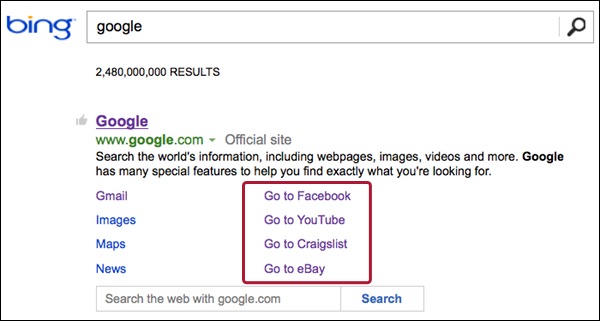A Test, Not A Bug: Bing Deep Links To Facebook, eBay, Craigslist Under Google’s Search Result
It looked like a screwup. If you searched for [google] on Bing, you saw Deep Links to Facebook, eBay and Craigslist underneath the main search result for Google. So, in my article earlier today, I called it a “strange bug” in Bing’s search results. I was wrong. It wasn’t a bug; it was a test […]

I was wrong.
It wasn’t a bug; it was a test that Bing was running and has now turned off. A Bing spokesperson confirmed for us this afternoon that this was no mistake.
We’re constantly updating and refining the Bing search experience to help people get things done more quickly. We are currently conducting tests on navigational links that will help people get to their ultimate search destination faster, including high traffic links for sites like Google, but have nothing further to share at this time.
If you missed the earlier article, this is what you saw earlier today if you searched for [google] on Bing.com:
Those are “Deep Links” — that’s Bing’s name for what Google calls Sitelinks. On both search engines, the standard behavior is that these extra links point to popular or important pages on the same domain as the main search result.
But Bing was changing four of the Deep Links under the Google search result and pointing them to completely different domains: Facebook.com, YouTube.com, Craigslist.org and Ebay.com.
Say what?!?! We sent over a few more questions via email to make sense out of this, and I’ll just paste the Q&A here with my questions and Bing’s replies.
Does Bing think that people who type “google” into the search box are actually looking for Facebook, eBay or Craigslist?
This experiment is part of our larger effort to develop a deep understanding of people’s actual intent for navigational queries such as “Google”. As part of these efforts, we’re continuously incorporating our signals into different experimental treatments for a wide variety of queries.
How do those Deep Links help users get things done/decide?
Bing was designed to help people go from searching and finding to searching and doing. We believe that getting people to their ultimate destination more quickly helps them get things done more quickly.
How would Bing respond if a search for “bing” on Google included Sitelinks to Twitter, Amazon or Kayak?
We appreciate all customer-focused innovation.
On that last answer, I highly doubt Bing would be happy if Google did something like this in its search results when people type “bing.”
But I think the second response is pretty revealing in terms of Bing’s motivation here. Year after year, navigational queries like these are among the most popular search terms. According to Experian’s data from a couple weeks ago, “facebook” was the most popular search term, “youtube” was No. 2, “craigslist” No. 3 and “ebay” was seventh.
It’s one of the craziest search tests I’ve seen, but Bing’s saying that it thinks a lot of people that type “google” into its search box are ultimately looking for these websites, so they’re just going to link right to them from Bing’s own Deep Links.
Depending on your perspective, it’s either brilliant or absolutely nuts or something in between.
Bing tells us that this wasn’t a standalone test: “Google is one of several sites that we have run similar experiments on.”
If you try to see this for yourself right now, you’re out of luck. The Deep Links changed after our article was posted this afternoon. Bing says “the test was scheduled to be completed today, and is in fact done. We expect to run additional tests in the future.”
After seeing this one, I’m curious to see what Bing’s planning to test next. The mind races.
Opinions expressed in this article are those of the guest author and not necessarily Search Engine Land. Staff authors are listed here.
Related stories
New on Search Engine Land
